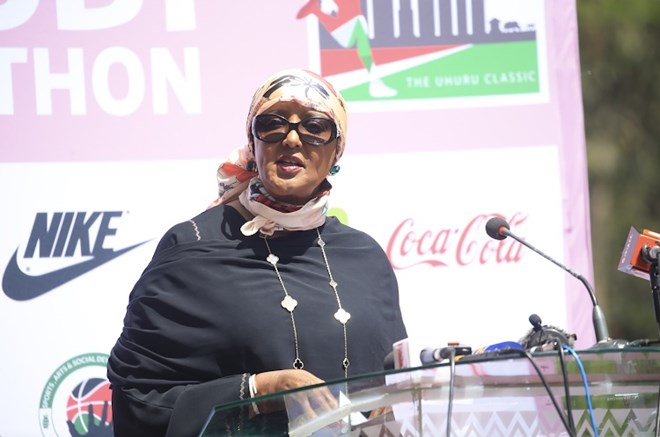
Thursday December 7, 2023
By ALLAN KISIA
Former Sports Cabinet Secretary Amina Mohamed Image: ERICK BARASA
Former Cabinet Secretary Amina Mohamed was on Wednesday unanimously admitted into the Interpeace Governing Board.
The Interpeace Governing Board is the highest decision-making body of the organisation and plays a key role in defining Interpeace’s overall strategy.
It is the legal authority that is responsible for the organisation.
“I am truly honoured and grateful to the Governing Board for this appointment and the opportunity to contribute to the work of a highly respected organisation. It is a privilege to be part of a most distinguished team and thankful for your confidence in me,” Ambassador Amina said.
advertisements
Amina said she is looking forward to working with the board on the most pressing and challenging issues of the day.Amina served as CS for Education, Foreign Affairs and Sports, Heritage and Culture in retired President Uhuru Kenyatta’s administration.
The Governing Board is made up of prominent individuals from the government, international, and business sectors.
There is also a seat for the host government, Switzerland, and a designated representative of the United Nations Secretary-General.
It is chaired by Egypt’s former Foreign Affairs minister Amre Moussa.
Interpeace is an international organization that prevents violence and builds lasting peace. The organisation has 27 years of experience working in Africa, the Middle East, Asia, Europe and Latin America.
Many solutions to conflict do not last because they are imposed or do not take fully into account the views and needs of those who are most affected.
Interpeace works to have solutions designed and led locally from the grassroots communities to the most senior decision-making levels.
Interpeace was created in 1994 as the “War-torn Societies Project”, a United Nations project to assist the international community and national actors to respond better to the challenges of countries emerging from war.
Matthias Stiefel championed and founded the project and is now Vice Chair of the Governing Board. Initial field projects were in Eritrea and Mozambique. Guatemala, Somaliland and Puntland (Somali region) quickly followed.
To address the specific challenges societies face in post-conflict situations, and the shortfalls of many peace interventions, a participatory action-research approach was developed.
It embodies the principles of strengthening local capacity and responsibility, inclusive participation, use of relevant data and analysis, consensus-based decision-making and practical policy impact.
With adaptations over the years, this participatory methodology remains the foundation of the work of Interpeace today.